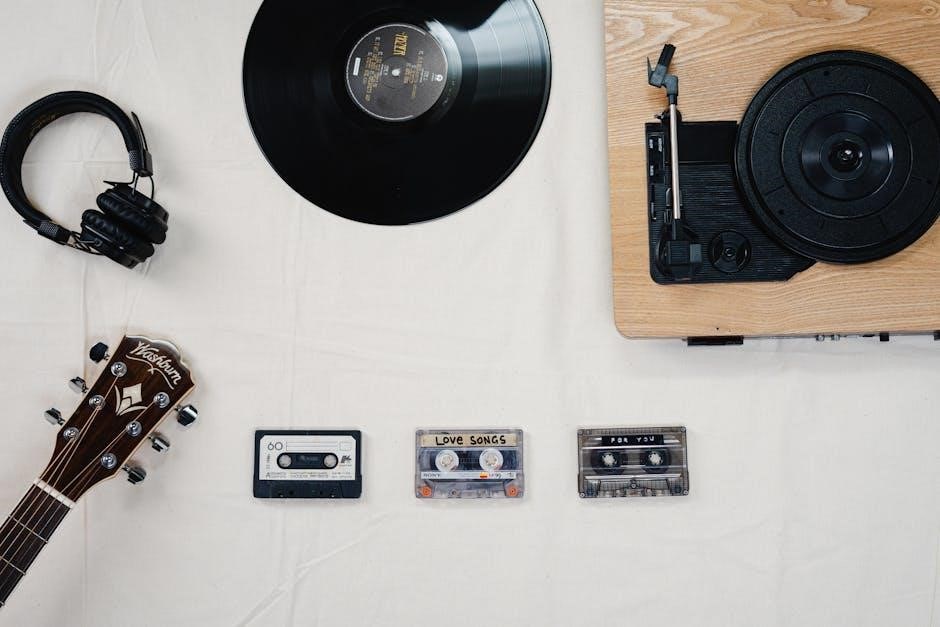
Hookup culture‚ prevalent on college campuses‚ involves casual sexual encounters‚ often without emotional attachment. Emerging as a significant social phenomenon‚ it impacts mental health and emotional well-being‚ shaped by evolving sexual norms and media influence.
Definition and Overview
Hookup culture refers to the prevalence of casual sexual encounters‚ often without emotional attachment‚ among individuals‚ particularly on college campuses. A hookup is broadly defined as sexual intimacy ranging from kissing to oral‚ vaginal‚ or anal sex. This culture emphasizes short-term‚ non-committal relationships‚ contrasting traditional dating norms. It is characterized by its casual nature‚ often facilitated by social media‚ dating apps‚ and alcohol. While some view hookups as empowering‚ others critique their emotional detachment. Hookup culture is deeply ingrained in modern societal norms‚ with media and popular culture normalizing it. Despite its prevalence‚ not all individuals participate‚ with some opting out or expressing ambivalence. The phenomenon reflects shifting sexual norms and evolving definitions of intimacy in contemporary society.
Historical Context and Evolution
Hookup culture traces its roots to the 1920s‚ when young people began socializing in mixed-sex groups without supervision‚ marking a shift in sexual norms. The 1960s sexual revolution further accelerated this change‚ normalizing casual sex. By the 2000s‚ hookup culture became prevalent on college campuses‚ fueled by dating apps and social media. It evolved from earlier practices like “petting parties” into a normalized form of casual intimacy. The rise of apps like Tinder and the influence of media have cemented its place in modern society. Hookup culture reflects broader societal changes‚ including shifting gender roles and the de-stigmatization of non-traditional sexual practices. Over time‚ it has become a defining aspect of contemporary sexual norms‚ particularly among younger generations‚ blending casual encounters with evolving definitions of intimacy and relationships.

Psychological Aspects of Hookup Culture
Hookup culture significantly impacts emotional and mental well-being‚ with attachment styles influencing behavior. It often leads to mixed emotions‚ affecting self-esteem and emotional health.
Attachment Styles and Hookup Behavior
Attachment styles significantly influence engagement in hookup culture‚ with securely attached individuals often navigating casual encounters with ease. Those with anxious or avoidant styles may struggle‚ as hookups can exacerbate feelings of insecurity or intimacy avoidance. Research suggests that individuals with insecure attachment patterns are more likely to seek validation through hookups‚ often leading to emotional dissatisfaction. Conversely‚ securely attached individuals may view hookups as a form of exploration without negative emotional consequences. The interplay between attachment styles and hookup behavior highlights how early relational experiences shape attitudes toward casual sex and intimacy. Understanding these dynamics is crucial for addressing the psychological impacts of hookup culture on emotional well-being and relationship formation.
Emotional and Mental Health Impacts
Engaging in hookup culture can have significant emotional and mental health consequences. Many participants report feelings of anxiety‚ depression‚ and emotional distress following casual encounters. The lack of emotional intimacy in hookups often leaves individuals feeling disconnected and unsatisfied. Research indicates that frequent hookup behavior is associated with higher rates of psychological distress‚ particularly among women‚ who may experience heightened feelings of objectification. Additionally‚ the pressure to conform to hookup norms can lead to feelings of guilt or shame‚ especially for those who prefer more meaningful connections. Conversely‚ some individuals report positive experiences‚ such as increased confidence or empowerment. However‚ for many‚ the emotional toll of hookup culture outweighs its perceived benefits‚ highlighting the need for greater awareness of its mental health implications. Balancing personal desires with emotional well-being remains a critical challenge in this context.
Self-Esteem and Validation Through Hookups
Hookup culture often serves as a means for individuals to seek validation and boost their self-esteem. For some‚ casual sexual encounters provide a sense of confidence and attractiveness‚ particularly when they receive positive feedback or attention from others. Women‚ in particular‚ have reported feeling validated through hookups‚ as they may perceive male attention as a form of affirmation. However‚ this validation is often temporary and superficial‚ leaving individuals emotionally unfulfilled. The emphasis on physical appeal in hookup culture can create pressure to conform to certain standards‚ potentially harming self-esteem in the long run. While some find empowerment in casual interactions‚ others may struggle with feelings of emptiness or low self-worth. This dynamic highlights the complex relationship between hookups and self-esteem‚ as validation sought through physical connections may not translate to lasting emotional satisfaction or personal growth.

Sociological Perspectives
Hookup culture reflects evolving gender norms‚ social expectations‚ and media influence‚ shaping casual sexual interactions and redefining traditional relationship structures in contemporary society.
Gender Roles in Hookup Culture
Genders roles in hookup culture reveal distinct dynamics‚ with men often initiating encounters and women seeking validation through participation. While men may prioritize casual sex‚ women frequently report seeking emotional or self-esteem boosts. Societal expectations perpetuate these behaviors‚ reinforcing traditional norms where men are seen as dominant and women as submissive. However‚ feminist perspectives argue that women’s active participation challenges these roles‚ suggesting a shift toward empowerment. Despite this‚ the pressure to conform to gender norms remains prevalent‚ influencing decisions and experiences within hookup culture. These dynamics highlight the complex interplay between gender roles and sexual interactions in contemporary society.
Social Pressure and Norms
Social pressure significantly influences participation in hookup culture‚ often presenting it as a normative college experience. Many students feel compelled to engage in casual encounters to fit in or avoid social exclusion. Media portrayal glorifies hookups‚ reinforcing their appeal and creating unrealistic expectations. Peer groups and campus environments further amplify these pressures‚ making abstention feel unconventional. While some navigate this culture comfortably‚ others experience ambivalence or discomfort‚ leading to internal conflicts. The prevalence of hookups is often exaggerated‚ with studies showing a third of students opting out entirely. Despite this‚ the perception of widespread participation perpetuates the pressure‚ shaping decisions and behaviors among young adults navigating their sexual and social identities.
Diverse Sexual Practices and Their Acceptance
Diverse sexual practices within hookup culture have expanded societal acceptance of non-traditional intimacy. Hookups often include a range of activities‚ from kissing to oral and anal sex‚ reflecting a shift away from vaginal intercourse. This diversification challenges conventional norms‚ with media and popular culture normalizing these practices. However‚ while acceptance has grown‚ disparities exist‚ with certain acts still stigmatized. The rise of hookup culture coincides with increased discussion of sexual preferences and boundaries‚ fostering a more open dialogue about intimacy. Despite this‚ concerns remain about the physical and emotional risks associated with casual encounters‚ particularly the higher likelihood of sexually transmitted infections due to inconsistent condom use. Overall‚ the broader acceptance of diverse sexual practices highlights evolving attitudes toward sexuality and relationships in contemporary society.

Media Influence on Hookup Culture
Media portrays hookups as casual and fun‚ shaping perceptions and normalizing the culture. Movies‚ TV shows‚ music‚ and social media often glorify non-committal encounters‚ influencing young adults’ behaviors and attitudes toward intimacy and relationships.
Portrayal in Movies and Television
Movies and television shows often depict hookup culture as a casual‚ fun‚ and accepted part of modern life. Films like The To Do List and series like Friends with Benefits normalize non-committal encounters‚ shaping young adults’ perceptions. These portrayals frequently romanticize hookups‚ emphasizing excitement and freedom while downplaying emotional or physical risks. Characters are often shown engaging in casual sex without lasting consequences‚ reinforcing the idea that hookups are a normal and desirable part of relationships. Such depictions contribute to the normalization of hookup culture‚ influencing viewers to adopt similar attitudes and behaviors. However‚ they rarely explore the complexities or potential downsides‚ creating a skewed representation of casual intimacy.
Role of Music and Social Media
Music and social media significantly influence hookup culture by normalizing casual intimacy and promoting a carefree attitude toward sex. Popular songs often glorify one-night stands and non-committal relationships‚ with artists like Ariana Grande and The Weeknd reflecting these themes. Social media platforms like Instagram‚ TikTok‚ and Tinder amplify hookup culture by creating spaces for casual flirting and instant connections. Influencers and trending challenges frequently normalize sexting‚ casual dating‚ and the pursuit of physical attraction over emotional depth. Dating apps‚ in particular‚ have become tools for facilitating hookups‚ with their swipe-based interfaces and emphasis on physical appeal. Together‚ music and social media foster an environment where casual sex is not only accepted but also encouraged‚ shaping societal attitudes and behaviors around intimacy.

Impact of Dating Apps and Online Platforms
Dating apps like Tinder‚ Bumble‚ and others have revolutionized modern dating by facilitating casual encounters and normalizing hookup culture. These platforms enable users to connect quickly‚ often prioritizing physical attraction over meaningful relationships. Geolocation features and swipe-based interfaces make hookups more accessible and convenient. The rise of these apps has coincided with an increase in hookup culture‚ as they provide a space for individuals to seek short-term‚ no-strings-attached interactions. Social media platforms further amplify this trend by creating a culture of instant gratification and visual appeal. As a result‚ online platforms have become central to the evolution and normalization of hookup culture‚ reshaping traditional dating norms and expectations.

Hookup Culture on College Campuses
Hookup culture is prevalent on college campuses‚ influencing students’ social and sexual behaviors. It often leads to casual encounters‚ impacting mental health and emotional well-being among participants.
Prevalence and Participation Rates
Hookup culture is widely prevalent on college campuses‚ with studies indicating that a significant majority of students engage in casual sexual encounters. Research shows that approximately two-thirds of college students participate in hookups during their time at university. However‚ participation rates vary widely among individuals‚ with some students opting out entirely‚ while others engage frequently. Factors such as gender‚ ethnicity‚ and personal beliefs influence these rates. Despite its prevalence‚ hookup culture is not universally embraced‚ with many students expressing ambivalence or dissatisfaction with casual encounters. The normalization of hookups has led to a cultural shift‚ where they are often seen as a rite of passage‚ despite concerns about their impact on mental and emotional well-being.
Hookup Culture as a Social Phenomenon
Hookup culture represents a significant shift in societal norms‚ reflecting changing attitudes toward sexuality and relationships. It has become a dominant social phenomenon‚ particularly among young adults‚ influenced by media‚ technology‚ and evolving gender roles. The rise of dating apps and social media has further normalized casual encounters‚ making them a cornerstone of modern dating culture. This shift is marked by a departure from traditional courtship practices‚ emphasizing short-term connections over long-term commitments. Hookup culture is both a product and a driver of broader cultural changes‚ including increased sexual liberation and the de-stigmatization of non-monogamous relationships. Despite its widespread acceptance‚ it remains a topic of debate‚ with critics highlighting its potential negative impacts on mental health and emotional well-being. As a social phenomenon‚ hookup culture continues to shape and be shaped by the values and practices of contemporary society.
Comparative Studies Across Institutions
Comparative studies across institutions reveal varying levels of engagement with hookup culture‚ influenced by factors like student demographics‚ campus policies‚ and cultural norms. Research indicates that hookup participation rates differ significantly between colleges‚ with some institutions reporting higher rates due to their social and academic environments. For instance‚ liberal arts colleges often show greater engagement compared to religious or commuter schools. Additionally‚ studies highlight regional variations‚ with urban campuses tending to have more casual encounters than rural ones. International comparisons further illustrate cultural differences‚ as hookup practices are more accepted in some countries than others. These comparative analyses provide insights into how institutional and cultural contexts shape hookup culture‚ emphasizing the need for tailored approaches to understanding and addressing its implications across diverse settings.

Ethical and Cultural Debates
Hookup culture sparks ethical debates‚ with feminists arguing about empowerment versus objectification. Moral concerns arise about commitment and intimacy. Cultural variations influence acceptance‚ impacting relationships and personal values.
Feminist Perspectives on Hookup Culture
Feminist perspectives on hookup culture vary‚ with some viewing it as empowering‚ allowing women to embrace sexual freedom without societal judgment. Others argue it perpetuates objectification‚ reducing women to sexual objects rather than equals. The debate centers on whether hookup culture challenges traditional gender roles or reinforces them. Some feminists highlight how women can reclaim their sexuality‚ while others express concerns about the lack of emotional fulfillment and the pressure to conform to unrealistic standards. The conversation also touches on consent‚ autonomy‚ and the broader societal structures that influence sexual dynamics. Ultimately‚ feminists seek to understand how hookup culture intersects with gender equality and personal agency.
Moral and Ethical Considerations
Hookup culture raises significant moral and ethical questions‚ particularly regarding consent‚ respect‚ and the commodification of sex. Critics argue that it often prioritizes physical gratification over emotional connection‚ potentially leading to exploitation and objectification. The normalization of casual sex can blur boundaries of consent‚ especially in situations involving power imbalances or alcohol use. Additionally‚ the emphasis on short-term encounters may undermine the value of long-term‚ committed relationships. Ethical concerns also arise regarding the societal pressure to participate‚ which can marginalize those who opt out. The moral implications of hookup culture are further complicated by its portrayal in media‚ which often glorifies casual sex without addressing its emotional or ethical ramifications. These debates highlight the need for ongoing discussions about respect‚ autonomy‚ and the ethical dimensions of sexual interactions in contemporary society.
Cultural Variations and Hookup Practices
Cultural variations significantly influence hookup practices‚ with differing norms and values shaping attitudes toward casual sex. In Western societies‚ hookup culture is often normalized‚ particularly on college campuses‚ where it is seen as a rite of passage. However‚ in more conservative cultures‚ such as in some Asian or Middle Eastern societies‚ traditional norms emphasize premarital abstinence and familial approval‚ making hookup practices taboo. Media and globalization have spread Western hookup culture to more conservative regions‚ leading to internal conflicts between modern and traditional values. Generational differences also play a role‚ with younger individuals more likely to embrace casual sex while older generations adhere to conventional norms. The rise of dating apps and online platforms has further normalized hookup practices‚ creating a globalized yet culturally diverse landscape of sexual encounters.

Research and Studies
Recent studies highlight the evolving nature of hookup culture‚ emphasizing its psychological‚ sociological‚ and cultural dimensions. Research focuses on gender roles‚ attachment styles‚ and social norms influencing casual sexual encounters.
Key Findings from Recent Research
Recent studies on hookup culture reveal diverse implications for mental health‚ with some participants experiencing emotional distress‚ while others report positive outcomes. Gender roles play a significant role‚ as women often seek validation through hookups‚ while men typically initiate encounters; Research also indicates that attachment styles influence participation‚ with those having insecure attachments more likely to engage in casual sex. Additionally‚ the rise of dating apps has normalized hookup culture‚ making it a mainstream phenomenon. However‚ a third of students opt out‚ finding it unappealing. Overall‚ findings suggest that hookup culture is a complex‚ multifaceted phenomenon shaped by psychological‚ social‚ and cultural factors.
Methodologies in Hookup Culture Studies
Research on hookup culture employs diverse methodologies‚ including surveys‚ interviews‚ and focus groups‚ to explore participant experiences and perceptions. Quantitative studies often utilize large-scale surveys to assess prevalence and demographics‚ while qualitative approaches delve into personal narratives and emotional impacts. Mixed-method designs combine both‚ offering a comprehensive understanding. Longitudinal studies track changes in behavior and attitudes over time‚ providing insights into cultural shifts. Researchers also analyze social media and dating apps to examine how technology influences hookup practices. These methodologies collectively reveal the complex dynamics of hookup culture‚ highlighting psychological‚ social‚ and cultural factors that shape individual experiences and societal norms surrounding casual sexual encounters.
Emerging Trends and Future Research Directions
Emerging trends in hookup culture research highlight the growing influence of technology‚ such as dating apps‚ in shaping casual sexual encounters. Future studies should explore the intersection of hookup culture with race‚ ethnicity‚ and socioeconomic status‚ as these factors remain underexamined. Additionally‚ there is a need to investigate the long-term psychological and emotional impacts of hookup culture‚ particularly in relation to mental health outcomes. Researchers are also encouraged to examine how cultural and societal norms outside of Western contexts influence hookup practices. Expanding methodologies to include more longitudinal and cross-cultural studies could provide deeper insights into the evolution of hookup culture. By addressing these gaps‚ future research can offer a more comprehensive understanding of hookup culture’s role in modern society and its implications for individual and collective well-being.
Hookup culture remains a significant aspect of modern relationships‚ reflecting shifting norms and values. Its impact on mental health and societal dynamics underscores the need for continued exploration and understanding.
Hookup culture‚ characterized by casual sexual encounters‚ has become a prevalent social phenomenon‚ particularly on college campuses. It reflects shifting sexual norms‚ influenced by media‚ dating apps‚ and evolving societal values. Research highlights its psychological impacts‚ including effects on mental health‚ attachment styles‚ and self-esteem. While some participants find empowerment‚ others experience emotional distress or dissatisfaction. Feminist perspectives argue that women play a significant role in perpetuating this culture‚ challenging traditional dating norms. Ethical debates question the implications for committed relationships and sexual health. Overall‚ hookup culture is a complex‚ multifaceted issue‚ shaped by individual and societal factors‚ requiring further exploration to understand its long-term effects on personal and cultural landscapes.
Final Thoughts on Hookup Culture’s Impact
Hookup culture has had a profound and multifaceted impact on modern society‚ particularly among young adults. While it offers some individuals empowerment and sexual exploration‚ it also raises concerns about mental health‚ emotional well-being‚ and relationship dynamics. The normalization of casual encounters has challenged traditional dating norms‚ creating a culture where intimacy is often decoupled from commitment. Media and dating apps have further amplified this shift‚ influencing perceptions of love and sex. However‚ critics argue that hookup culture can foster dissatisfaction‚ as some individuals struggle with unmet emotional needs or feelings of isolation. Ultimately‚ the impact of hookup culture is complex‚ reflecting broader societal changes in sexuality‚ gender roles‚ and interpersonal connections. Its effects will likely continue to evolve as cultural norms and technologies advance‚ necessitating ongoing dialogue and understanding.
Recommendations for Future Studies
Future research on hookup culture should prioritize exploring its long-term psychological and emotional impacts‚ particularly among diverse demographic groups. Studies should examine how attachment styles influence hookup behavior and vice versa‚ as well as the role of cultural and societal norms in shaping these practices. Additionally‚ investigating the intersection of hookup culture with mental health outcomes‚ such as anxiety or depression‚ could provide valuable insights. Researchers should also consider the impact of digital platforms and dating apps on hookup behaviors‚ as these technologies continue to evolve. Longitudinal studies would help capture changes in attitudes and behaviors over time. Furthermore‚ incorporating intersectional perspectives‚ such as how race‚ gender‚ and socioeconomic status affect experiences within hookup culture‚ would enrich the understanding of this complex phenomenon. Such comprehensive research could inform interventions aimed at promoting healthier sexual and relational practices.




